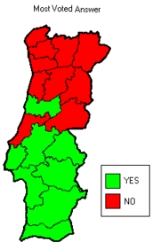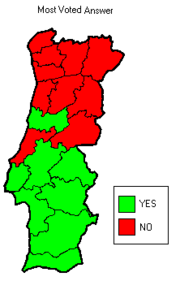
Portuguese referendum on Abortion, 1998
Encyclopedia
On 28 June 1998 a referendum
on a new abortion
law was conducted in Portugal
; it was the first national referendum in the Portuguese history
. The law was proposed by the Portuguese Communist Party
and it decriminalized
abortion during the first ten weeks of pregnancy and was considered by the left as the only way to put an end to the estimated 20 to 50 thousand illegal abortions in the country. The law was approved in the Assembly of the Republic
through a majority of the center-left and left-wing parties, but an agreement between the Socialist Party
and the Social Democratic Party
parties leaders led to the referendum.
The referendum was held on a summer day, which is said to have contributed to the fact that the turnout was so low that it didn't pass the threshold of 50 percent of the voters needed to make the decision binding, although the winning answer, NO, was respected and the law wasn't changed, meaning abortion was only allowed in exceptional case (such as rape
, mal-formations
of the fetus
and danger to the women's health). In the following years, a few dozen women (a small minority of the estimated illegal abortions) were defendants in three trials for abortion.
A revote occurred in the Portuguese abortion referendum, 2007
, where the result was reversed.
The question present in the ballots was: "Do you agree with the decriminalization of the voluntary interruption of the pregnancy, if it takes place in the first 10 weeks and in an authorized healthcare institution?"

Referendum
A referendum is a direct vote in which an entire electorate is asked to either accept or reject a particular proposal. This may result in the adoption of a new constitution, a constitutional amendment, a law, the recall of an elected official or simply a specific government policy. It is a form of...
on a new abortion
Abortion
Abortion is defined as the termination of pregnancy by the removal or expulsion from the uterus of a fetus or embryo prior to viability. An abortion can occur spontaneously, in which case it is usually called a miscarriage, or it can be purposely induced...
law was conducted in Portugal
Portugal
Portugal , officially the Portuguese Republic is a country situated in southwestern Europe on the Iberian Peninsula. Portugal is the westernmost country of Europe, and is bordered by the Atlantic Ocean to the West and South and by Spain to the North and East. The Atlantic archipelagos of the...
; it was the first national referendum in the Portuguese history
History of Portugal
The history of Portugal, a European and an Atlantic nation, dates back to the Early Middle Ages. In the 15th and 16th centuries, it ascended to the status of a world power during Europe's "Age of Discovery" as it built up a vast empire including possessions in South America, Africa, Asia and...
. The law was proposed by the Portuguese Communist Party
Portuguese Communist Party
The Portuguese Communist Party is a major left-wing political party in Portugal. It is a Marxist-Leninist party, and its organization is based upon democratic centralism. The party also considers itself to be patriotic and internationalist....
and it decriminalized
Decriminalization
Decriminalization or Decriminalisation is the abolition of criminal penalties in relation to certain acts, perhaps retroactively, though perhaps regulated permits or fines might still apply . The reverse process is criminalization.Decriminalization reflects changing social and moral views...
abortion during the first ten weeks of pregnancy and was considered by the left as the only way to put an end to the estimated 20 to 50 thousand illegal abortions in the country. The law was approved in the Assembly of the Republic
Assembly of the Republic
The Assembly of the Republic is the Portuguese parliament. It is located in a historical building in Lisbon, referred to as Palácio de São Bento, the site of an old Benedictine monastery...
through a majority of the center-left and left-wing parties, but an agreement between the Socialist Party
Socialist Party (Portugal)
The Socialist Party , abbreviated to PS, is a social-democratic political party in Portugal. It was founded on 19 April 1973 in the German city of Bad Münstereifel, by militants from Portuguese Socialist Action ....
and the Social Democratic Party
Social Democratic Party (Portugal)
The Social Democratic Party , is a centre-right liberal conservative political party in Portugal. It is commonly known by its initials, PSD; on ballot papers, its initials appear as PPD/PSD, with the first three letters coming from the party's original name, Democratic People's Party...
parties leaders led to the referendum.
The referendum was held on a summer day, which is said to have contributed to the fact that the turnout was so low that it didn't pass the threshold of 50 percent of the voters needed to make the decision binding, although the winning answer, NO, was respected and the law wasn't changed, meaning abortion was only allowed in exceptional case (such as rape
Rape
Rape is a type of sexual assault usually involving sexual intercourse, which is initiated by one or more persons against another person without that person's consent. The act may be carried out by physical force, coercion, abuse of authority or with a person who is incapable of valid consent. The...
, mal-formations
Congenital disorder
A congenital disorder, or congenital disease, is a condition existing at birth and often before birth, or that develops during the first month of life , regardless of causation...
of the fetus
Fetus
A fetus is a developing mammal or other viviparous vertebrate after the embryonic stage and before birth.In humans, the fetal stage of prenatal development starts at the beginning of the 11th week in gestational age, which is the 9th week after fertilization.-Etymology and spelling variations:The...
and danger to the women's health). In the following years, a few dozen women (a small minority of the estimated illegal abortions) were defendants in three trials for abortion.
A revote occurred in the Portuguese abortion referendum, 2007
Portuguese abortion referendum, 2007
An abortion referendum took place in Portugal on February 11, 2007, to decide whether to legalise abortion up to ten weeks. The referendum was the fulfillment of an election pledge by the governing Socialist Party of Prime Minister José Sócrates....
, where the result was reversed.
The question present in the ballots was: "Do you agree with the decriminalization of the voluntary interruption of the pregnancy, if it takes place in the first 10 weeks and in an authorized healthcare institution?"
Political positions
The major parties in Portugal at the time listed with their political positioning and their official answer to the referendum question:- Left
- Portuguese Communist PartyPortuguese Communist PartyThe Portuguese Communist Party is a major left-wing political party in Portugal. It is a Marxist-Leninist party, and its organization is based upon democratic centralism. The party also considers itself to be patriotic and internationalist....
- YES - Ecologist Party "The Greens" - YES
- Socialist PartySocialist Party (Portugal)The Socialist Party , abbreviated to PS, is a social-democratic political party in Portugal. It was founded on 19 April 1973 in the German city of Bad Münstereifel, by militants from Portuguese Socialist Action ....
- NEUTRAL (most of the party said YES, however, important members, including the General-Secretary and Prime-Minister António GuterresAntónio GuterresAntónio Manuel de Oliveira Guterres, GCC is a Portuguese politician, a former prime minister and President of the Socialist International. Currently he is the United Nations High Commissioner for Refugees.-Early life:...
said NO)
- Portuguese Communist Party
- Right
- Social Democratic PartySocial Democratic Party (Portugal)The Social Democratic Party , is a centre-right liberal conservative political party in Portugal. It is commonly known by its initials, PSD; on ballot papers, its initials appear as PPD/PSD, with the first three letters coming from the party's original name, Democratic People's Party...
- NEUTRAL - Democratic and Social Centre – People's Party - NO
- Social Democratic Party
Results

| No: 1,356,754 (50.91%) | Yes: 1,308,130 (49.09%) | ||
| ▲ |

